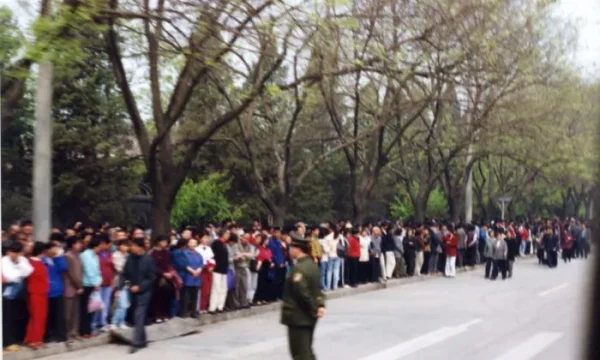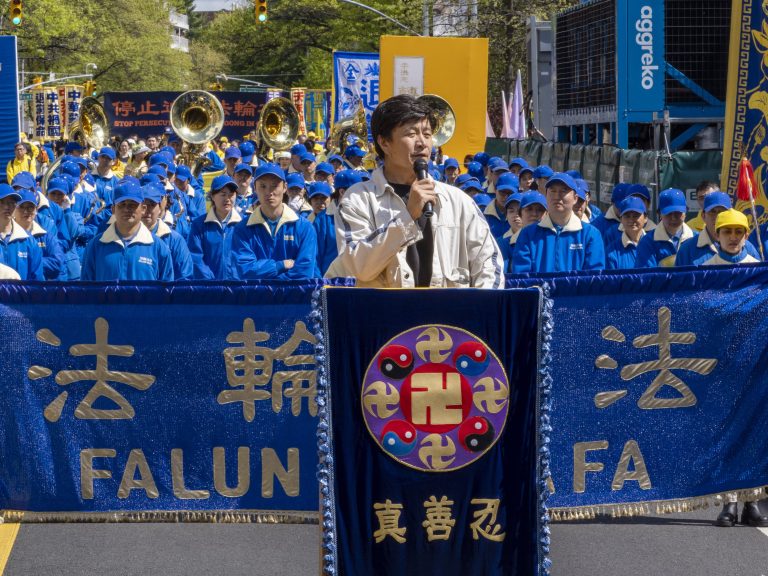NEW YORK, N.Y. — Last weekend, thousands of Falun Gong practitioners held events in Flushing, Queens, and on the Hudson riverside opposite the Chinese consulate in Manhattan to commemorate the 24th year since, in 1999, adherents of the traditional spiritual practice asked China’s communist leadership for respect and understanding.
Between 10,000 and 20,000 people took part in the calm demonstration before the Chinese Communist Party (CCP) headquarters in Beijing.
Three months later, the Party began its nationwide campaign to “eradicate” Falun Gong, a Buddhist-school faith that teaches truthfulness, compassion, and forbearance.
For this year’s commemoration, several thousand Falun Gong adherents took part in the parade and rally that took place in Flushing, which is one of New York’s major Chinese-American communities, on April 23 (Sunday), while hundreds attended the candlelight vigil that evening near the western end of 42nd St. Several speakers from the Falun Gong associations and survivors of persecution gave comment or shared their experiences.

Wang Shanshan, a Falun Gong practitioner who left China while pregnant with her second daughter (then banned under the CCP’s one-child policy) in 2013, held a placard calling for the release of her mother, Liu Aihua, who was sentenced to four years in prison for passing out flyers clarifying the truth about Falun Gong in China.
Success
You are now signed up for our newsletter
Success
Check your email to complete sign up
The persecution of Falun Gong is the single worst ongoing humanitarian disaster in China. According to human rights organizations and investigators, millions of Chinese have been arrested for practicing or standing up for the faith, and tens of thousands have likely been murdered to fuel China’s expanding organ transplant industry.
Peaceful appeal
For China, the April 25th appeal marked a turning point similar to the Tiananmen Square protests, which occurred a decade earlier in 1989, but ended with the massacre carried out by martial law troops dispatched by the CCP.
In this case, rather than silencing political dissent, the Communist Party was crushing a group that had no ambitions other than the spiritual and physical improvement of its members.
Falun Gong, also known as Falun Dafa (法輪大法), was the most popular of many qigong meditative energy practices that were popular in China since the 1970s but had ancient roots in the country’s long history of spiritual cultivation.
Prior to being subject to all-out persecution in July 1999, Falun Gong was approved of by the authorities, who praised its founder, Master Li Hongzhi, for bringing physical and spiritual improvement to his students.
But those in the CCP regime who saw Li’s spiritual teachings as a threat to the Party’s Marxism and atheism, including then-leader Jiang Zemin, ramped up pressure on Falun Gong in the latter half of the 1990s. Secret police monitored Falun Gong practitioners as they meditated in parks, and state media began to criticize the practice as “feudal superstition” or being against science.

The April 25 appeal came after the arrests of 45 Falun Gong practitioners in a city near Beijing prompted thousands of adherents to assemble silently before Zhongnanhai — the CCP headquarters in the Forbidden City. Some meditated while others spoke with police officers and helped them manage the crowd.
Zhu Rongji, China’s premier at the time, granted an audience with several Falun Gong practitioners and assured them that they were free to exercise their faith. But Jiang took the event as undeniable proof that Falun Gong would lead to the Communist Party’s demise. In internal speeches, he gave orders to plan and carry out the anti-Falun Gong campaign, which continues to the present.
According to a 2017 report by Freedom House, 7 to 20 million people still practice Falun Gong in China, many of whom risk their safety to raise awareness about the persecution and encourage their fellow Chinese to awaken to the tyrannical nature of the Communist Party.
Owing to these efforts, more than 400 million Chinese have taken part in the grassroots movement to renounce their oaths made when joining the CCP or its affiliated youth organizations, the Communist Youth League and Young Pioneers.
“It’s the CCP that chose to make enemies with truthfulness, compassion, and tolerance,” Elise He, a Falun Gong adherent who took part in the April 25 appeal in 1999, told The Epoch Times. “They pushed such a group of people to the opposite side.”















